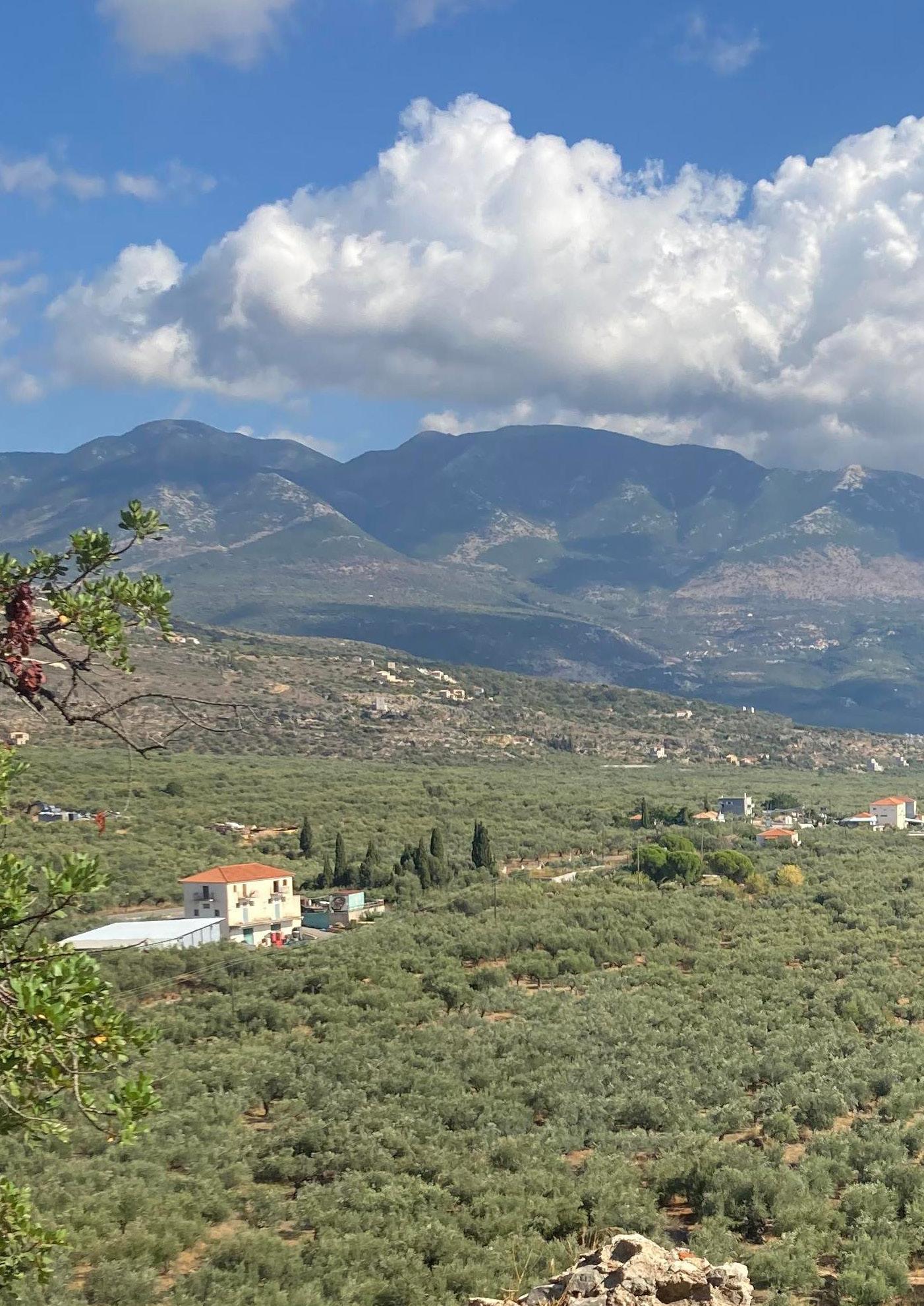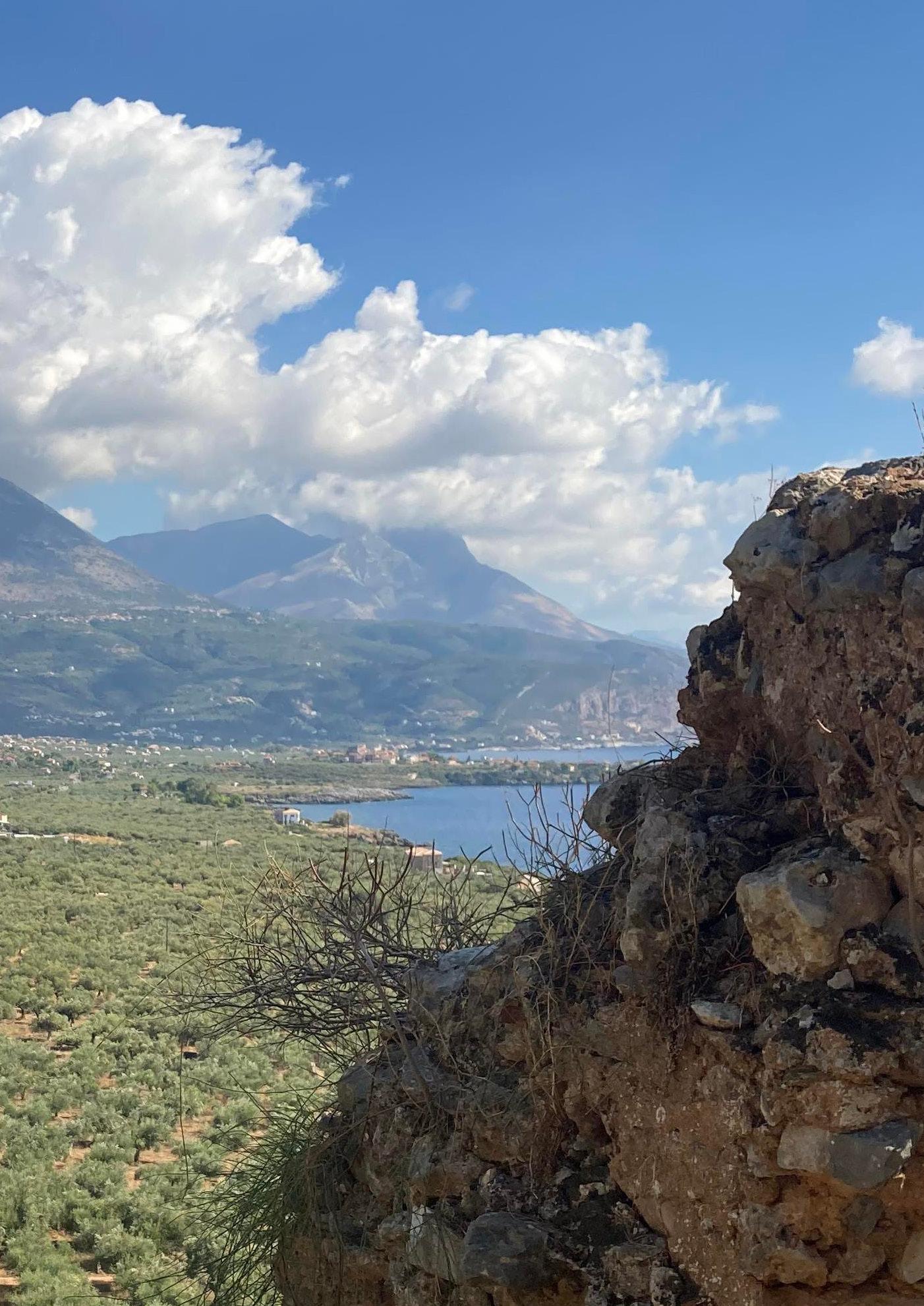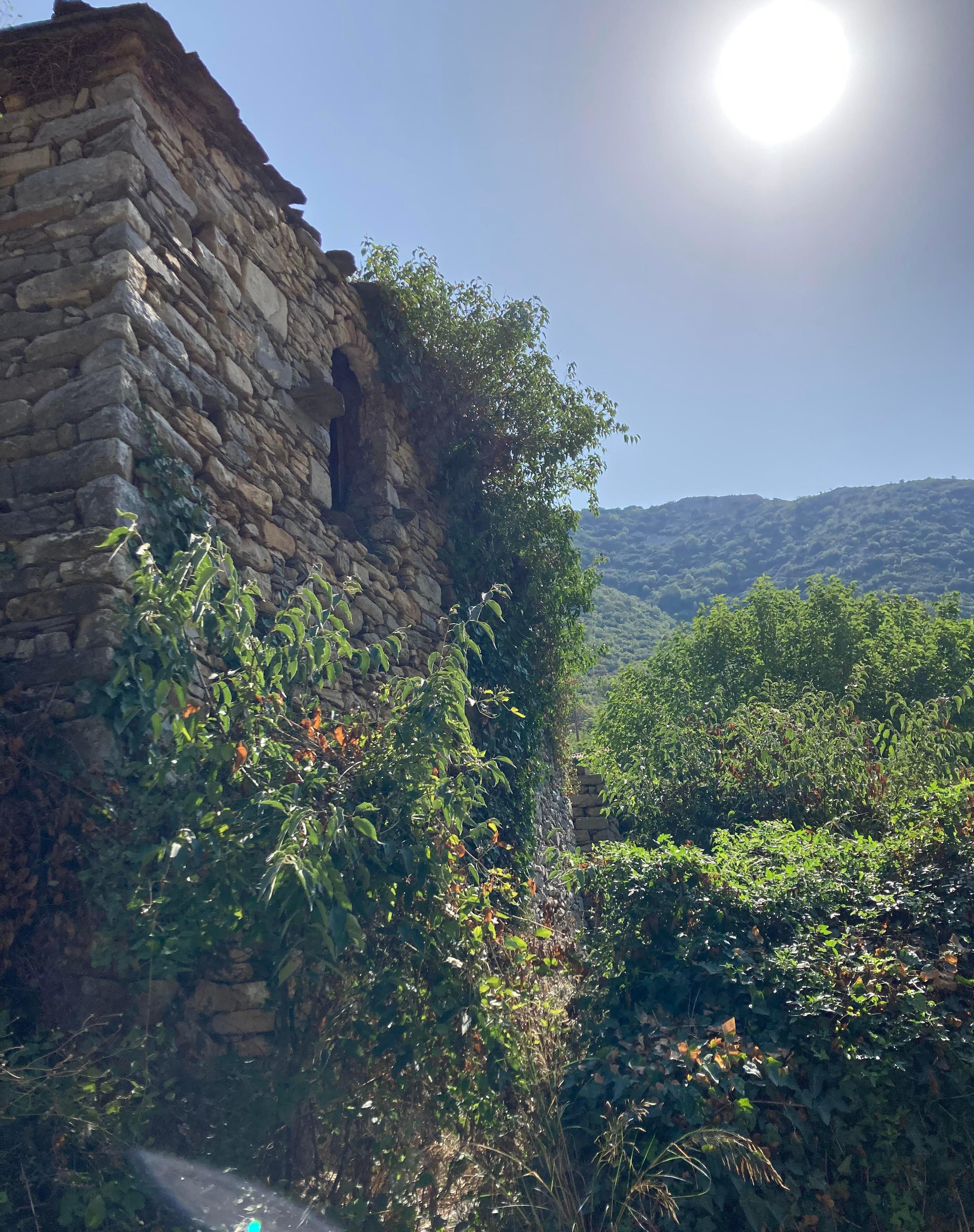
8 minute read
A village out of time
from Tabula 1 - 2021
Av Oskar Lein
It is a strange thing - finding myself on a sunbed I am suddenly struck by a sense that I am sitting at the Edge of the world, with the ever-present feeling that I could be slipping down into the abyss before me. The Notion of this ‘abyss’ is constituted by a simple visual phenomenon, when I look ahead, I see the Messenian sea, the waves go on as usual. Leave it to the poets to drool over the properties of salt, rock and algae. Over me is the sky, dotted with clouds, the occasional rays of sun peeking through. Yet, further ahead, the sky and the sea become intermingled in the same shade of blue. It feels like the Aether is there, wisps of fog complete the illusion. This then serves as a great attractor, it feels like my soul is residing in my bowels, and that a great torrent is roaring therein, my soul is not bursting out, it is slowly seeping into the ether before me, in my mind’s eye it takes the form of a cloud of black sand, whisking away towards the horizon. All of this gives the sense that I am residing in a world operating according to Ptolemaic or pre-Newtonian mechanics, I am sitting at the very Edge of the oikumene! This then is the ordeal a would-be medievalist on a Greek beach faces after almost two years of existence within a 60-kilometer radius of Oslo. Restlessness and longing. The experience of waking up in a foreign land after a night of flight, ever an uncomfortable thing, like teleportation. How did I cheat my way here?
Advertisement
This Notion suddenly starts to fade, the feeling in my bowels could be due to the dozen fried sardines I had for lunch. Likewise, I am not fond of sunbeds, I shall have to find something to do which roots me in the experience of the here and now, and as such, I go about writing this travelogue. If this is an archaic land, mother of a vast portion of the clichés in the western Canon, the laws of Draco, the Delphic maxim etc. Then this travelogue shall likewise be marred by archaizing language and a cascade of grecophile clichés! Since, in the words of Plato, no human thing is of serious importance!
The first day
I cannot remember the sensation of waking up; since it is well past midday already. I have eaten several meals, smelled the occasional eucalyptus tree and talked gibberish to a limp kitten which most likely will be put down by one of the assertive elderlies who roam about the village, always looking for some occurrence or situation in which to inject themselves.
I was sitting at a cafe earlier, doing my best to ‘fall into the Mediterranean rhythm’ as the cliché goes. Since there was a heavy downpour all night, a rusty truck equipped with a cylindrical tank was creeping down the road alongside said cafe. The ‘crew’ operated some kind of pump and were apparently pumping the water out of the basements. An elderly man appeared, he roamed about, never straying far from the truck. Suddenly he was on the phone, quite agitated. His hands were making all sorts of bellicose movements. I smelled cinnamon and turned around; a stray dog wandered off. I associated the smell with the dog, but then I turned my nose towards my book. I was reading ‘The Peloponnesian war’ at the time, which I found to be quite dull, a statement which surely is heretical but to which I still adhere. It had a sweet tang to it, but not cinnamon? Maybe it was the dog? Anyways, as I returned to the scene in front of me, a truck full of cows went by, the man was now speaking to the crew of the water truck, they subsequently left while the old man was standing in the middle of the street, gesturing with great movements towards oncoming traffic and with a repetitious flicking movement signaling the truck forward. ‘Gods’ I thought, contemplating the man and his majestic gray curls and moustache, ‘this must be a sort of latter-day Socrates, or a kind of messianic character.’
I leave the village center along the main road, heading northwards towards the Taygetos mountains. After a short trip to the local mini market, I head back. To my left I see an elderly couple outside what looks like a workshop. I cross the road, and as I pass, I stop and produce a stiff downward gesture of greeting with my head. Workshop? I ask, the man rises and gestures me to come inside. The smell of mountain herbs is omnipresent, the shop is cluttered, all around are a plethora of unidentifiable plants in various shriveled and parched forms. The man goes on about the different healing properties of his homemade salves. Above me I see two scythes, latched onto a crossbeam. For cutting herbs? Yes! He says, the big one was my mother’s, he makes a gesture indicating the huge stature of the woman. The small one belonged to my aunt, with a glint in his eye he bends his knees and tips slightly forward. I reckon I have triggered his innate Greek ability of telling a good story. «It was hard work! » he continues. Before machines, men did the heavy work while women did these tasks, so their backs were bent! A coarse laugh. Today, young men are only sitting on laptops, not good, they need balance! He gives me a look. Could this be a sort of testing question? I try to ingratiate myself. I know! My family was blacksmiths! Hard work before machine in Norway as well. Yes balance, moderation! I did it, a reference to moderation, ever the primary virtue of the ancient Greeks. The man looks pleased, I passed the test. He goes on «Before we had a good blacksmith in Kardamyli! He train many young people, then he and whole family die in car crash. He gestures towards a tiny orthodox shrine across the road, as to imply that the blacksmith had died outside the workshop. I had been bested by his superior worldliness and cynicism, as I left, I could do nothing else than mutter something about the nice smell and thank him goodbye. This is as apt an opportunity for describing the location of my visit as any other: The Peloponnese, which is severed from the rest of continental Greece by the Channel which now cuts through the Corinthian isthmus. Its name, which means Pelops Island is derived from the Phrygian Pelops, the mythical founder of the house of Atreus, of which later kings would claim decent. Indeed, here was of old the kingdom of Mycenae. From whence the great Agamemnon would lead the Achaeans across the sea, only to be slain upon his return by the blade of his wife Clytemnestra. Then came the Dorians, and among them the Spartans, who would rise as potentates and masters of Pelops Island. The picturesque hamlet of Kardamyli has existed since this early age, it was among those villages which were offered by Agamemnon to Achilles to appease his wroth after the former had taken the consort Briseis. It lies on the southern shore of the Peloponnese, in the northwest of the second of three ‘fingers’ which stretch southwards from the Peloponnese towards Libya. Here it resides, between the sea on one side, and the foothills of the vast Taygetos range on the other. A great gorge leads upwards from the village, into the mountains. Here cross many paths, some which lead to other, smaller hamlets, some which lead to remote monasteries. Yet wherever they may lead, they are all traversed by the stubborn mountain goats. The village has a main road running through it, to the west of this road lies the sea. And between these two the seafront portion of the village, which contains several specimens of what an elderly British person would refer to as ‘enchanting tavernas’. To the east there are several abandoned houses and also a group of abandoned houses which have been in this state for even longer. colloquially referred to as the ‘old town’ if you then proceed longer in this direction you will find - guess what - abandoned houses which are of - yet again - an even earlier date(!)outfitted with a museum and a tiny church, this is the ‘castle’. To fill out the blanks for you, imagine oleander, eucalyptus and Jasmin. An undercurrent of catpiss, gasoline and of course a fresh ocean breeze. The occasional Scabby kitten in an alley, a droopy dog lounging behind some wire betwixt some olive trees. The sounds of Greeks talking, birds chirping and cars screeching. Oh, and not least the mosquitos. In the end, the author was not able to continue his travelogue. But for that first day, it gave him relief from the overhanging sensation of anxiety. In time, this feeling diminished, then it was replaced by a sense of dullness. This was likely due to the fact that he spent his days longing for home and reading Thucydides, whom he found to be a repetitive writer, who was, in his writings, wholly occupied with demonstrating his vast rhetorical abilities, and as such, held in common with the present author that he was a pompous git.












